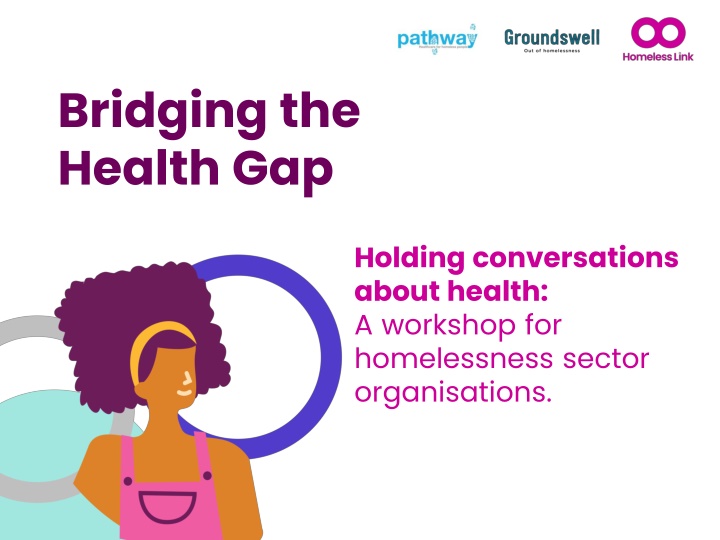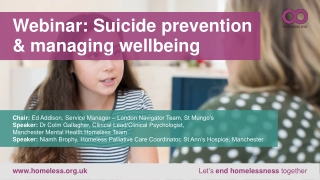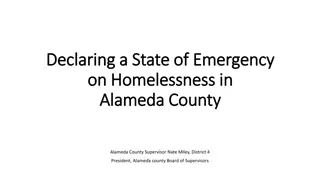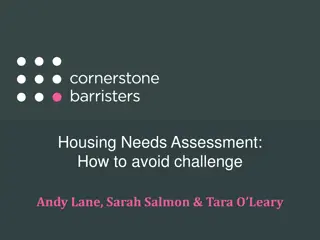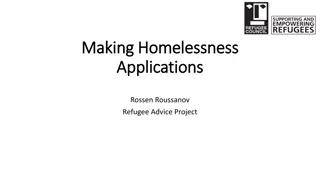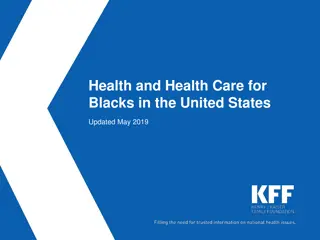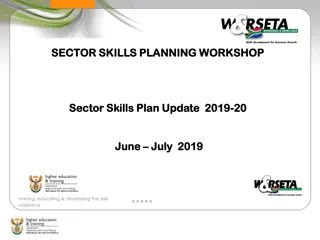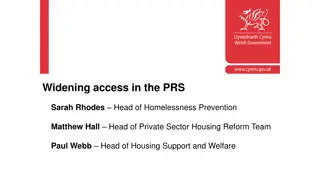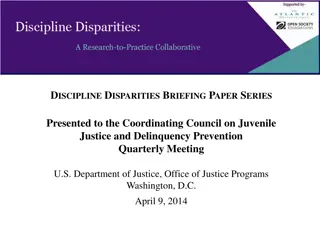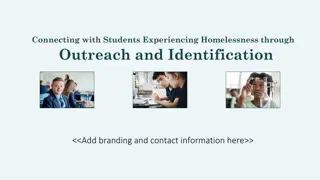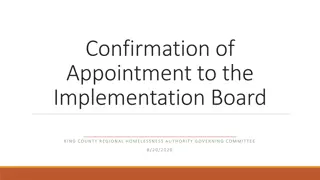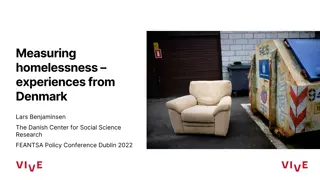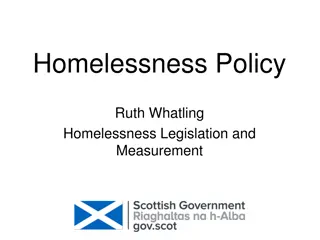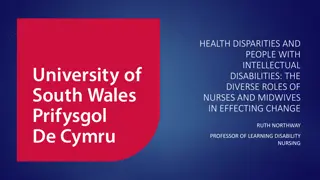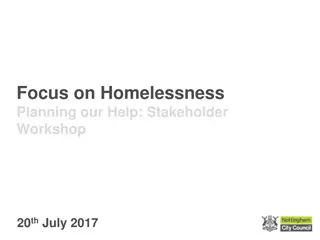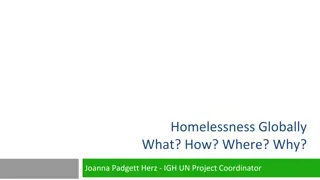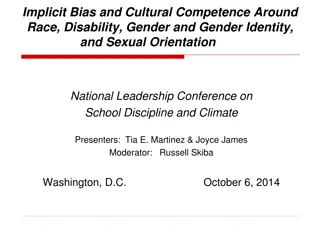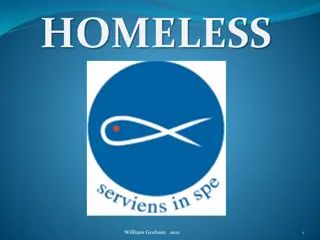Addressing Health Disparities in Homelessness Sector: A Workshop Overview
Conversations about health are vital for individuals experiencing homelessness, who often face significant health challenges. Homelessness support workers play a crucial role in promoting access to healthcare services and facilitating discussions on general health topics. Dispelling myths about healthcare access is essential, as everyone, regardless of immigration status, is entitled to free primary healthcare in the UK. An interactive exercise encourages reflecting on positive healthcare support experiences, highlighting the importance of specialized medical knowledge in providing effective health support. This workshop aims to empower workers in the homelessness sector to engage in constructive health conversations.
Download Presentation

Please find below an Image/Link to download the presentation.
The content on the website is provided AS IS for your information and personal use only. It may not be sold, licensed, or shared on other websites without obtaining consent from the author.If you encounter any issues during the download, it is possible that the publisher has removed the file from their server.
You are allowed to download the files provided on this website for personal or commercial use, subject to the condition that they are used lawfully. All files are the property of their respective owners.
The content on the website is provided AS IS for your information and personal use only. It may not be sold, licensed, or shared on other websites without obtaining consent from the author.
E N D
Presentation Transcript
Bridging the Health Gap Holding conversations about health: A workshop for homelessness sector organisations.
Introduction Why are health conversations important? People experiencing homelessness have some of the worst health outcomes and rely heavily on emergency medical care. The average age of death for a homeless woman is 41.6 years compared to 45.9 for men (ONS, 2021). People who are homeless are 9x more likely to take their own lives. The prevalence of Tuberculosis is 34x higher than in the general population. The prevalence of heart disease is 6x higher than in the general population.
Introduction The role of homelessness support workers Homelessness workers play a key role in encouraging people to engage with more upstream health care. Homelessness workers spend a lot of their time supporting people with health and social care needs. Conversations initiated are typically focused on emergency health care needs. Staff have the skills but may lack confidence to have more general health conversations.
Introduction Myths about access to health services MYTHS FACTS You have to have an address to register at a GP. If an individual has no fixed address/is homeless, they are entitled to register for a GP using either a temporary address (a day centre, friend s address) or use the address of the GP. You need ID to register at a GP. GP Practices have a responsibility to register people who are unable to provide ID or documentation to indicate them living in a particular area. All primary health care (including: GP services, primary dental treatment, A&E etc.) as well as testing, treatment & vaccination against COVID-19 is free for everyone, regardless of immigration status. You have to have status in the UK to access free NHS health care.
Introduction Exercise what is good health support: instructions Spend 3-5 mins thinking and writing. Think of a time when you have had a positive experience of seeking support around your health. Write down some of the features that made this experience a positive one. This may be from a professional, friend or family member. Spend 5 minutes sharing the features.
Introduction Exercise what is good health support: feedback Hear feedback from the group. Write a list of feedback. How many of these features require you to have specialist medical knowledge? How many can you deliver yourself as a support worker? REFLECTION: workers in the homelessness sector have all the skills needed to hold positive conversations around health.
Introduction Exercise Content & Impact of Health Conversations As a group, discuss what a conversation about health might look like. For example, what sorts of questions would you be asking during the conversation? Discuss what you are trying to achieve by having these conversations. For example, how might the conversation have a positive impact on that individual s health outcomes?
Film Clip Less Less is a film made by people with lived experience of homelessness. It details some of the key moments of their experiences including some of their experiences of accessing health services. Watch the extract from the film and think about what barriers people experiencing homelessness may face when accessing healthcare services.
Film Clip Less Watch from 0 mins 25 seconds to 1 min 55 seconds.
Film Clip Discussion 5 minutes What other barriers might people experiencing homelessness face when accessing healthcare services? What barriers to accessing healthcare services were raised in the film?
Barriers to accessing healthcare Stigma Fear Previous negative experiences Lack of address to register with GP (not needed but often demanded) Lack of fixed address for correspondence Conflicting priorities: need to find sleeping site, money, food substance misuse etc Multiple health support needs Cost of travel to appointments Waiting times Lack of confidence There will be others
Film Clip Clarissa Clarissa is a film about a woman experiencing homelessness. It was created to improve the health of people affected by homelessness, through better understanding of their experiences. CONTENT WARNING Clarissa explores themes relating to childhood abuse, drug taking and drug dependency. The sections we are watching do not contain these scenes. If you need further support in relation to these issues, please discuss this with your manager. The film was made by Groundswell who are a charity that aims to create solutions to end homelessness that come directly from people who have been homeless. They have a strong focus on health and deliver a range of resources including information leaflets, training and a Homeless Health Peer Advocacy service.
Film Clip Clarissa The extract shows some interactions between an outreach worker and the main character. We are not suggesting that this is good practice. Watch the clip and think about: What do you think the outreach worker could have done differently? What do you think would make a positive health interaction? Is there anything the outreach worker does well?
Film Clip Clarissa Watch from 3 mins 40 to 6 mins 20.
Film Clip Discussion Discussion 5 minutes What did you think? Any general reflections? What do you think the outreach worker could have done differently? Is there anything the outreach worker does well? What do you think would make a positive health conversation?
What makes a good health conversation? Positive relationship: Trust and respect built up over time Person-led: Listening to what the person wants Asking open questions Ask don t tell Approach: Non-judgemental Respectful You can learn more about Groundswell s MACCA approach in the resources that accompany this session Inclusive: Using inclusive language Equal conversation Self-advocacy: People make their own decisions Encourage people to do as much as possible for themselves
Discussion Barriers for support workers What are some of the barriers that you face in supporting the people you work with to talk about their health/access services? 1 2 Discuss this in a group of 3-4 people Share with the main group 3 What resources, training, information and support do you need to have more health conversations with the people you work with?
Available resources Holding Conversations about Health Resources Template list of contacts for organisations Lists existing training, information and leaflets on accessing healthcare and different health conditions Add to and complete for your organisation with contact information of services that you would find useful Brief introduction to Making All Contacts Count through Advocacy (MACCA) Recorded webinar on approaches to holding conversations about health An approach to holding health conversations designed specifically for homelessness workers
What we do homeless.org.uk Homeless Link is the national membership charity for frontline homelessness services. We work to improve services through research, guidance and learning, and campaign for policy change that will ensure everyone has a place to call home and the support they need to keep it. @HomelessLink
